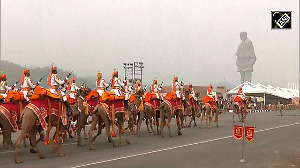Part I: Should the NSA be diplomat or spy?
Should India have a National Security Advisor or a National Security Coordinator?
Should the National Security Adviser focus only on national security issues or should s/he also be involved in issues relating to diplomacy?
These were some of the issues that were discussed on January 15 at a seminar on national security organised by the association of retired senior police officers in collaboration with the India International Centre, New Delhi.
Former prime minister P V Narasimha Rao's death last month rekindled a debate on his role in developing India's nuclear power amongst strategy experts.
The seminar could not skirt the issue.
K Subrahmanyam, doyen of India's strategy analysts, narrated Narasimha Rao's role in the development of India's nuclear weapon and said it was Rao who had advised his successor Atal Bihari Vajpayee to carry out the nuclear test.
Read about: J N Dixit on Pakistan's nuclear tests
P R Chari, former additional defence secretary, who now works with the Institute of Peace and Conflict Studies, New Delhi, dismissed this as a part of India's Nuclear folklore lacking evidence.
Subrahmanyam objected to this and said that Rao himself had mentioned this (his role in the development of the nuclear weapon) in a signed statement before the Kargil Review Committee.
He added that the Committee's recommendation to have Rao's statement released to the press in order to show how all prime ministers since Indira Gandhi had contributed to the development of India's nuclear capability was not accepted by the Vajpayee government.
Subrahmanyam also underlined the importance of issues such as better governance, removal of corruption, breaking the nexus between politicians and criminals for strengthening national security.
He pointed out that the National Security Council hardly met since it was set up in 1999. He also described the Bharatiya Janata Party government's decision to merge the Joint Intelligence Committee with the National Security Council Secretariat as unwise.
This led to some heated discussions between Subrahmanyam and D C Pathak, former director, Intelligence Bureau, who is now a member of the National Security Advisory Board.
The new government and national security
Pathak, who has also served as chairman of the Joint Intelligence Committee for a few years before his retirement, maintained that merging of the JIC and the NSC Secretariat has not in any way affected the objectivity and usefulness of the assessment of intelligence.
Subrahmanyam did not agree with this.
PMO casual about national security: Subrahmanyam
While discussing the role of National Security Advisor's office, Girish Chandra Saxena, former head of the Research and Analysis Wing, opposed proposals for a national security or Intelligence czar in India and said nothing should be done which would weaken the position of the intelligence chiefs.
rediff.com columnist B Raman, a former senior RAW official and an expert on terrorism, pointed out that whereas in the United States ;the national security advisor performed a dual role as advisor to the president on national security matters and as coordinator of the national security mechanism, in the United Kingdom the security and intelligence coordinator had his role cut out as coordinator.
Indo-US relations: Delhi dialogue and after
Raman also pointed out that in the US no national security advisor since the inception of this post in 1953 had any expertise in internal security matters.
They were essentially experts in foreign policy, who focused excessively on diplomacy. This led to a neglect of security and subsequently 9/11, he argued.
This led to a question as to whether India needs a National Security Advisor at all.
Many felt that while India needed someone at the top to coordinate national security matters, what should constitute his background and how he should operate must be decided according to India's requirements and we should not blindly imitate the US.





